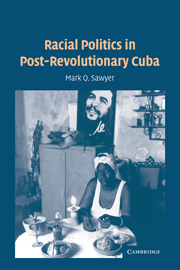Book contents
- Frontmatter
- Contents
- List of Figures and Tables
- Acknowledgments
- Introduction
- 1 Race Cycles, Racial Hierarchy, and Inclusionary Discrimination: A Dynamic Approach
- 2 Freedom and Discrimination: Uneven Inequality and Inclusion in Pre-Revolutionary Cuba
- 3 Race and Revolution: Transformation and Continuity
- 4 Match Made in Heaven or Strange Bedfellows? Black Radicals in Castro's Cuba
- 5 Race and Daily Life in Cuba During the Special Period: Part I: Interview Data
- 6 Race and Daily Life in Cuba During the Special Period: Part Ⅱ: Survey Research
- 7 Racial Politics in Miami: Ninety Miles and a World Away
- Conclusion
- Bibliography
- Index
Conclusion
Published online by Cambridge University Press: 05 September 2012
- Frontmatter
- Contents
- List of Figures and Tables
- Acknowledgments
- Introduction
- 1 Race Cycles, Racial Hierarchy, and Inclusionary Discrimination: A Dynamic Approach
- 2 Freedom and Discrimination: Uneven Inequality and Inclusion in Pre-Revolutionary Cuba
- 3 Race and Revolution: Transformation and Continuity
- 4 Match Made in Heaven or Strange Bedfellows? Black Radicals in Castro's Cuba
- 5 Race and Daily Life in Cuba During the Special Period: Part I: Interview Data
- 6 Race and Daily Life in Cuba During the Special Period: Part Ⅱ: Survey Research
- 7 Racial Politics in Miami: Ninety Miles and a World Away
- Conclusion
- Bibliography
- Index
Summary
Race Cycles
The Cuban Revolution followed the race cycles pattern delineated in Chapter 1. When periods of crisis and transnational politics created progress for blacks, subsequent periods of state consolidation institutionalized some of the gains made during the crisis period; these consolidation periods were characterized by stagnant progress for blacks, a resurgence of pre-existing racial ideology, a denial of racism, and assertions that the race problem had been solved. Racial ideology proved to be an extremely powerful variable in Cuba that set limits on progress and justified consolidation. It has defined the limits of racial improvements and state consolidation in Cuba. The adaptability of racial ideologies has defied even revolutionary changes in other realms of society.
The regime of the revolution in 1959 created an opening in Cuban racial politics that had a precedent only in the transition of Cuba from a colony to an independent state. While the independence movement helped to end slavery and to bring formal citizenship rights to Cubans of color, the Cuban Revolution eliminated vestiges of formal segregation that remained within society. It also addressed many private forms of discrimination that had been untouched in the Republican period.
Nevertheless, the intervention of the revolution into racial matters had limits. Following the Bay of Pigs invasion, the Cuban state, concerned about further U.S. intervention but buoyed by the defeat of the United States, began to consolidate around ideals of socialism, Third World internationalism, and national unity.
- Type
- Chapter
- Information
- Racial Politics in Post-Revolutionary Cuba , pp. 175 - 182Publisher: Cambridge University PressPrint publication year: 2005



